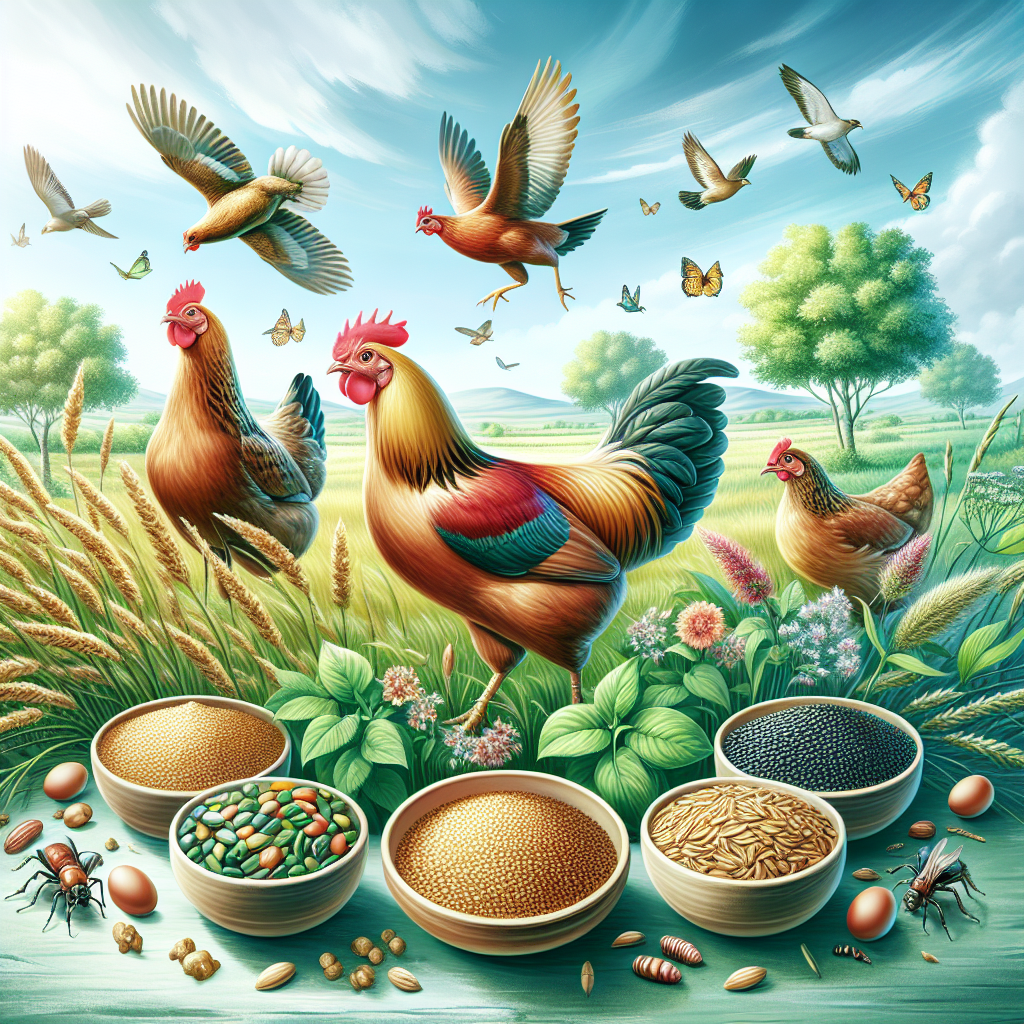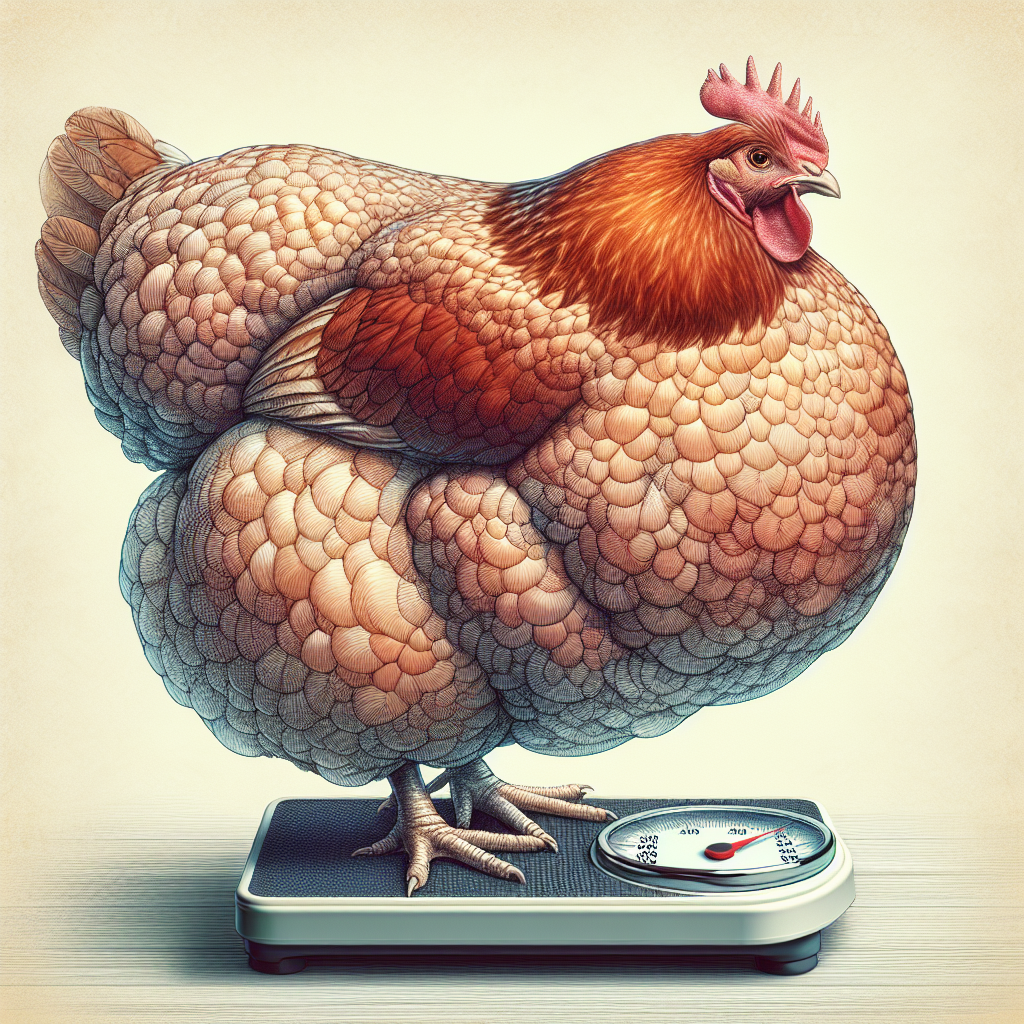So you’ve decided to raise your own flock of free-ranging chickens, but now you find yourself wondering how to manage their feed and nutrition. Well, fret not, because in this article, we’ll explore some essential tips on keeping your feathered friends well-fed and healthy. From understanding their dietary needs to finding the right balance of grains, proteins, and supplements, we’ve got you covered. Whether you’re a beginner or an experienced chicken keeper, read on to discover the secrets of managing feed and nutrition for your free-ranging chickens.
Understanding Free-ranging Chickens’ Diet
When it comes to free-ranging chickens, understanding their diet is crucial for their overall health and well-being. These birds have a natural instinct to forage and search for food, so it’s essential to provide them with a balanced and nutritious diet. By considering their natural foraging behavior and key nutritional needs, you can design a feeding program that promotes optimal health and productivity.
Natural Foraging Behavior
Free-ranging chickens have a natural instinct to forage for their food. They are skilled at searching for insects, seeds, greens, and other edible items in their environment. Foraging not only provides them with necessary nutrition but also allows them to engage in natural behaviors, which is essential for their mental stimulation and overall happiness. Understanding and encouraging their natural foraging behavior is vital when designing their diet.
Key Nutritional Needs
To provide your free-ranging chickens with a balanced diet, it’s crucial to consider their key nutritional needs. Chickens require a proper balance of proteins, carbohydrates, fats, vitamins, and minerals to support their growth, reproduction, and overall health. A deficiency in any of these nutrients can lead to health problems and decreased productivity. By addressing these nutritional needs, you can ensure that your chickens thrive.
Designing a Balanced Diet
To design a balanced diet for your free-ranging chickens, you need to consider two main components – providing access to forage and supplementing with commercial feed. By combining these elements, you can meet their nutritional requirements and support their overall health and well-being.
Providing Access to Forage
The first step in designing a balanced diet for free-ranging chickens is to provide them with access to forage. This can be achieved by allowing them to graze in pastures, utilizing crop residues, encouraging insect habitat, and offering kitchen scraps and garden waste. These foraging options not only provide essential nutrients but also contribute to the chickens’ natural behavior and mental stimulation.
Supplementing with Commercial Feed
While foraging is crucial, it may not always provide all the necessary nutrients in the required quantities. Therefore, it’s essential to supplement their diet with a high-quality commercial feed. Look for feeds specifically formulated for chickens, which would provide a balanced mix of proteins, carbohydrates, fats, vitamins, and minerals. Supplementing with commercial feed helps fill in any nutritional gaps and ensures that your chickens receive all the necessary nutrients for their optimal health.
Ensuring Adequate Protein
Protein is one of the most crucial nutrients for chickens as it supports growth and development, feather quality, and egg production. To ensure adequate protein intake, it’s important to include protein-rich sources in their diet. This can be achieved by offering high-quality commercial feed that contains a significant amount of protein. Additionally, you can supplement their diet by including insects, such as mealworms or crickets, which are an excellent source of protein.
Including Essential Vitamins and Minerals
Vitamins and minerals are essential for maintaining the overall health and well-being of free-ranging chickens. These nutrients play a critical role in various bodily functions, including immune function, egg production, and bone development. Ensure that your chickens receive an adequate supply of essential vitamins, such as vitamin A, D, E, and B complex vitamins, as well as minerals like calcium, phosphorus, and iron. Including a mineral supplement or offering a complete commercial feed that contains these nutrients can help meet their requirements.
Forage Options and Management
To provide a variety of forage options for your free-ranging chickens, it’s important to explore different options and manage their availability effectively. By growing pasture for grazing, utilizing crop residues, encouraging insect habitat, and offering grains and seeds, you can ensure that your chickens have a diverse range of foraging opportunities and receive a nutritionally-rich diet.
Growing Pasture for Grazing
Growing pasture for your free-ranging chickens is an excellent way to provide them with a nutritious and natural foraging option. Choose a variety of grasses, legumes, and herbs that can be grazed by your chickens. Regularly rotate their access to different pasture areas to improve the sustainability and health of the forage.
Utilizing Crop Residues
After harvesting crops, there are often residues left behind that can serve as a valuable food source for chickens. Crop residues such as stalks, leaves, and discarded produce can be offered to the chickens, providing them with both nutrition and mental stimulation. However, ensure that any residues offered are safe for consumption and free from pesticides or other harmful chemicals.
Encouraging Insect Habitat
Insects are a natural favorite for free-ranging chickens, as they are a rich source of protein. Encouraging insect habitat in your chicken’s environment can be beneficial for both the chickens and the ecosystem. By maintaining areas with wildflowers, shrubs, and vegetation, you can create a conducive environment for insects. Additionally, consider adding insect houses or logs to attract beneficial insects for your chickens to enjoy.
Incorporating Kitchen Scraps and Garden Waste
Kitchen scraps and garden waste can be a valuable addition to your chicken’s diet. Vegetables, fruits, and other kitchen scraps can be offered to your chickens, providing them with a variety of flavors and nutrients. However, it’s important to avoid offering any toxic foods or those that may be harmful to chickens. Additionally, ensure that the scraps are fresh and free from mold or contaminants.
Offering Grains and Seeds
Grains and seeds are another great option for supplementing your free-ranging chicken’s diet. Whole grains, such as corn, wheat, or barley, can be offered in moderation to provide additional energy and variety to their diet. Seeds like sunflower seeds or pumpkin seeds are also enjoyed by chickens and can provide essential fats and nutrients. However, it’s important to avoid excessive feeding of grains and seeds, as this can lead to nutritional imbalances.
Offering Commercial Feed
While forage is essential, offering a high-quality commercial feed is crucial to ensure that your free-ranging chickens receive all the necessary nutrients in adequate quantities. When considering commercial feed, it’s important to understand feed labels, choose the right feed type, and adhere to feeding guidelines.
Understanding Feed Labels
Feed labels provide valuable information about the nutritional composition of the product and its suitability for your chickens. Look for labels that clearly state the ingredients, nutritional analysis, and any additional supplements or additives. Understanding these labels can help you make an informed choice and select a feed that meets your chicken’s specific nutritional requirements.
Choosing the Right Feed Type
There are various types of commercial feed available for chickens, including starter, grower, layer, and broiler feeds. Each feed type is specifically formulated to meet the nutritional needs of chickens at different stages of life or production. Choose a feed type that aligns with your chicken’s age, purpose, and nutritional requirements. Additionally, consider organic or non-GMO options if you prefer to feed your chickens with natural and sustainable options.
Feeding Guidelines
Feeding guidelines provided by the feed manufacturer can serve as a useful reference when offering commercial feed to your free-ranging chickens. These guidelines typically recommend the amount of feed to offer based on chicken’s age, weight, and purpose. Ensure that you follow these guidelines and adjust the amount of feed offered based on your chicken’s appetite, activity level, and body condition.
Providing Adequate Protein
Protein is a vital nutrient for free-ranging chickens, and ensuring they receive adequate protein is crucial for their overall health and productivity. Understanding the importance of protein, identifying sources of high-quality protein, and considering supplementation with insects can help meet the protein requirements of your chickens.
Importance of Protein
Protein plays a crucial role in various physiological functions within a chicken’s body. It is essential for growth, feather development, egg production, immune function, and the repair and maintenance of body tissues. Insufficient protein in the diet can lead to stunted growth, poor feather quality, decreased egg production, and weakened immune response. Providing adequate protein is, therefore, vital for ensuring the overall health and well-being of free-ranging chickens.
Sources of High-Quality Protein
There are several sources of high-quality protein that can be included in your chicken’s diet. Commercial feed formulated specifically for chickens often contains a balance of proteins from sources like soybean meal, fish meal, or corn gluten meal. These feeds provide a reliable and convenient source of protein. Additionally, insects such as mealworms, crickets, or black soldier fly larvae are highly regarded protein sources. Consider offering these live or dried insects as a supplement to your chicken’s diet.
Supplementing with Insects
Supplementing your chicken’s diet with insects can be a beneficial way to provide them with additional protein. Not only do insects offer a natural source of protein, but they also simulate the chickens’ natural foraging behavior, providing mental stimulation. Mealworms, black soldier fly larvae, or crickets can be easily incorporated into their diet. Whether offered live or dried, these insects are an excellent source of high-quality protein and can be enjoyed by chickens of all ages.
Essential Vitamins and Minerals
In addition to protein, free-ranging chickens require essential vitamins and minerals to maintain good health and optimize their productivity. Understanding their vitamin and mineral requirements, including calcium for eggshell formation, and providing grit for digestion, are important aspects of managing their nutrition.
Vitamin Requirements
Vitamins play a vital role in various physiological processes within a chicken’s body. Vitamin A is essential for vision, growth, and immune function. Vitamin D is important for calcium absorption and bone development. Vitamin E is an antioxidant that supports immune function and reproductive health. The B complex vitamins are involved in energy metabolism and overall cellular function. Ensuring a balanced diet that includes a variety of fresh greens, vegetables, fruits, and high-quality commercial feed can help meet their vitamin requirements.
Mineral Requirements
Minerals are critical for maintaining various bodily functions, including bone development, enzyme activity, feather quality, and eggshell formation. Calcium and phosphorus are the primary minerals required in large quantities. Calcium is especially important for layers as it is necessary for eggshell formation. Other essential minerals include iron, zinc, manganese, copper, and selenium. Offering a mineral supplement or providing a complete commercial feed that includes these minerals can help meet your chicken’s requirements.
Including Calcium for Eggshell Formation
Calcium is a vital mineral for layers, as it is necessary for the formation of strong and healthy eggshells. Providing a readily available source of calcium is essential to prevent deficiencies and ensure proper eggshell quality. Crushed oyster shells or ground limestone can be offered as a calcium supplement, either separately or mixed with the feed. This allows the layers to consume calcium at their own pace, ensuring optimal egg production and quality.
Providing Grit for Digestion
Chickens have a unique digestive system that requires grit to aid in the breakdown of food. Grit is small, hard particles that chickens consume, which help grind and break down food in the gizzard. Offering insoluble grit, such as crushed granite or small stones, is important for free-ranging chickens who don’t have access to natural grit sources. Ensure that grit is provided separately from the feed and made available at all times, allowing chickens to consume it as needed.
Water and Hydration
Water is a vital component of a chicken’s diet, and ensuring access to clean water is crucial for their overall health and well-being. Understanding the importance of clean water, providing multiple water sources, and implementing suitable watering systems are key aspects of managing hydration for free-ranging chickens.
Importance of Clean Water
Clean and fresh water is essential for the proper functioning of a chicken’s body. Water is involved in various physiological processes, including digestion, nutrient absorption, temperature regulation, and waste elimination. Ensuring that the water is free from contaminants, debris, and pathogens is crucial to prevent waterborne illnesses and keep your chickens healthy.
Access to Water Sources
Providing multiple sources of water allows free-ranging chickens to easily access water throughout their environment. Water should be located in convenient and accessible locations, ensuring that all chickens have equal opportunities to drink. Consider installing various waterers, such as traditional waterers, nipple waterers, or shallow dishes, to accommodate the different needs and preferences of your chickens.
Watering Systems
Using appropriate watering systems can help maintain the cleanliness and availability of water for free-ranging chickens. Consider using poultry-specific waterers that are designed to prevent contamination and spillage. Automatic waterers can provide a continuous supply of fresh water, ensuring that your chickens never run out. Regularly check and clean the watering systems to remove any debris, algae, or bacteria that may accumulate.
Feeding Guidelines Based on Age and Purpose
Feeding guidelines for free-ranging chickens can vary based on their age and purpose. Whether feeding chicks, layers, meat birds, or breeding stock, understanding their different nutritional requirements is crucial for their growth, productivity, and overall health. Tailoring the feed and nutrient composition based on their specific needs ensures that each group receives the appropriate nutrition.
Feeding Chicks
Chicks require a balanced diet that supports their rapid growth and development. A starter feed with high protein content, typically in the range of 18-20%, is ideal for newly hatched chicks. This high protein content aids in muscle and skeletal development and supports feather growth. As they mature, gradually transition them to a grower feed to meet their changing nutritional needs.
Feeding Layers
Layers, or chickens specifically kept for egg production, require a diet that supports high egg production while ensuring the overall health of the hens. A layer feed with approximately 16-18% protein is typically recommended for laying hens. This feed should also include additional calcium to support eggshell formation. Provide layer feed to your hens starting around 16-18 weeks of age or when they begin to lay eggs.
Feeding Meat Birds
Meat birds, such as broilers, require a diet that promotes rapid growth and efficient meat production. Feed them a broiler-specific diet with a protein content of around 20-23%, ideally in the form of a complete commercial feed. This high protein content helps support muscle development and overall body weight gain. Feed broilers according to the feed manufacturer’s recommendations based on their age and weight.
Feeding Breeding Stock
Breeding stock, whether for egg production or breeding purposes, have specific nutritional requirements to support successful reproduction. A breeder-specific feed is typically recommended for breeding stock, with a slightly lower protein content compared to layer feed (around 14-16%). This feed should also include additional vitamins and minerals to support fertility and egg production. Consult with the feed manufacturer or a poultry nutritionist for specific recommendations for your breeding stock.
Implementing Feeding Practices
Implementing appropriate feeding practices is essential for managing feed and nutrition for free-ranging chickens. Whether opting for free-choice feeding, scheduled feeding, or a combination of both, it’s important to monitor feed consumption and prevent overfeeding to maintain optimal health and productivity.
Free-choice Feeding
Free-choice feeding involves providing chickens with constant access to feed throughout the day. This method allows chickens to eat as per their appetite, mimicking their natural foraging behavior. Ensure that the feeders are kept clean and filled with fresh feed to prevent contamination. Monitor feed consumption regularly to ensure that chickens are not over or undereating.
Scheduled Feeding
Scheduled feeding involves providing chickens with set feeding times during the day. This method allows you to have better control over their feed intake and promotes more consistent nutrition. Offer the feed at specific times, allowing chickens to consume it within a designated period. This method may be particularly useful when managing chickens in confined spaces or when supplementing foraging with commercial feed.
Limiting Overfeeding
Overfeeding can lead to various health problems, including obesity, fatty liver syndrome, and reduced egg production. It’s important to monitor feed consumption and ensure that your chickens are not overeating. Adjust the amount of feed offered based on their appetite, activity level, and body condition. If you notice excessive weight gain or reduced egg production, consider reducing their feed intake or transitioning to a lower energy feed.
Monitoring Feed Consumption
Regularly monitoring feed consumption is crucial for managing feed and nutrition for free-ranging chickens. Keep track of the amount of feed offered and the amount consumed. This allows you to identify any changes in appetite, detect potential health issues, and adjust the feeding program accordingly. By staying mindful of their feed consumption, you can ensure that your chickens receive adequate nutrition while maintaining a healthy body weight.
Health and Nutritional Signs to Watch For
Observing and recognizing signs of malnutrition, nutritional deficiencies, or overfeeding is crucial to address specific health issues that your free-ranging chickens may experience. Regularly monitor their overall health and well-being, understanding the common signs and symptoms of these conditions, and taking appropriate measures when necessary.
Signs of Malnutrition
Malnutrition in chickens can present various signs, including stunted growth, weight loss, poor feather quality, reduced egg production, weakness, and decreased overall vitality. If you notice any signs of malnutrition, it’s important to review their diet and ensure that they are receiving a balanced and appropriate combination of forage, supplements, and commercial feed. Consult with a poultry nutritionist or veterinarian to address any nutritional deficiencies.
Symptoms of Nutritional Deficiencies
Specific nutritional deficiencies can lead to various health problems in chickens. For example, a deficiency in calcium can result in weak or soft eggshells, while a lack of vitamin D can cause poor bone development. Other deficiencies may manifest as poor feather quality, reduced growth, or increased susceptibility to diseases. Regularly check for these symptoms and address any nutritional deficiencies promptly to prevent further health complications.
Recognizing Overfeeding
Overfeeding can have detrimental effects on the health and productivity of your free-ranging chickens. Overweight birds, decreased egg production, excessive weight gain, or abnormal fat deposits are potential signs of overfeeding. If you suspect overfeeding, reassess their feeding program, adjust the feed quantity, and consider offering lower energy feeds. Encourage exercise and provide opportunities for increased physical activity to promote weight management.
Addressing Common Health Issues
Maintaining proper nutrition is vital for preventing and managing common health issues in free-ranging chickens. However, despite your best efforts, chickens may still experience health problems such as parasites, respiratory issues, or infections. Promptly address any observed health issues by consulting with a veterinarian who specializes in poultry health. A comprehensive approach that includes proper nutrition, cleanliness, and biosecurity measures helps minimize the risk of health issues and ensures the well-being of your free-ranging chickens.
In conclusion, understanding and managing the feed and nutrition of free-ranging chickens is essential for their overall health and well-being. By considering their natural foraging behavior, providing a balanced diet that includes both forage and commercial feed, meeting their protein, vitamin, and mineral requirements, and ensuring ample access to clean water, you can support their growth, productivity, and overall health. Implementing appropriate feeding practices, monitoring feed consumption, and recognizing signs of malnutrition or health issues allow for timely intervention and the maintenance of optimal health for your free-ranging chickens.




